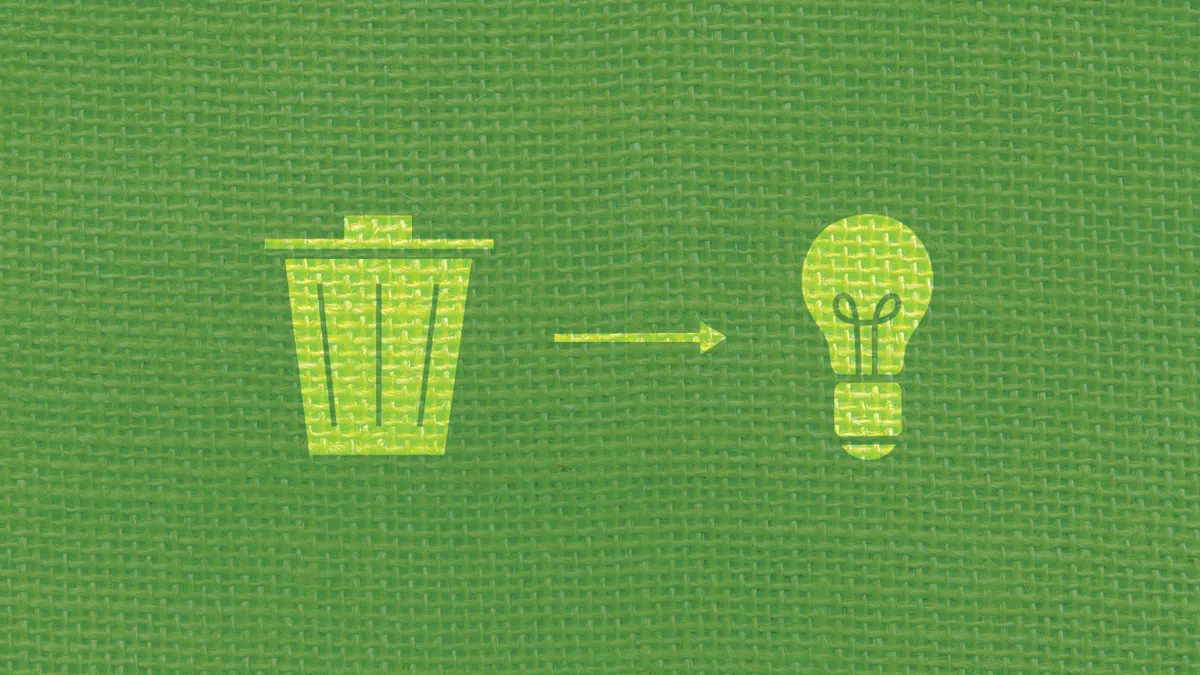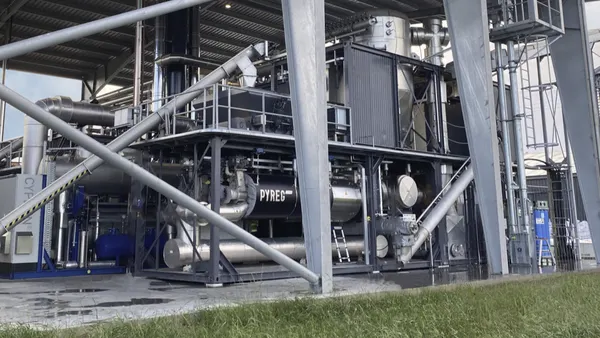Dive Brief:
- City College's Earth Engineering Center (EEC) has released a new report in response to arguments from the Global Alliance for Incinerator Alternatives (GAIA) that called waste-to-energy a "false path to zero waste" in September. "Their overall premise regarding sustainable waste management is erroneous and quite simply will lead to more waste going to landfills than ever before," writes EEC Director Marco Castaldi. "Lofty ideals and utopian schemes many times interrupt the practical, deployable solutions that currently exist to ensure the safest, most environmentally friendly management of society’s garbage."
- Castaldi makes a case for why he doesn't think it's viable to hold out for "perfect zero waste" through packaging redesign. In fact, he posits that the trend toward lightweight plastic packaging has already led to a "decoupling" of waste generation and economic growth. WTE combustion and refuse-derived fuel concepts are described as the best way to process this material after recycling.
- In direct response to GAIA's past work, Castaldi also highlights what are described as "several factual errors" about WTE emissions data, characterization of the Environmental Protection Agency's Non-Hazardous Secondary Materials (NHSM) rule, descriptions of various thermal conversion technologies, and assertions that WTE limits recycling. The report includes data from both the U.S. and E.U. about how WTE can be complementary to high recycling rates, and says this is the only viable solution to keep excess plastic out of landfills and waterways.
Dive Insight:
The EEC is a successor to Columbia University's Waste-to-Energy Research and Technology Council, conducting research on a range of topics including thermal conversion, ash recovery and material reuse. GAIA has been a familiar antagonist over the years, but one that Castaldi and his international counterparts usually chose to address through academic work rather than direct rebuttals. Though as the message that "zero waste" is attainable without landfills or waste-to-energy has became more prevalent Castaldi felt a need to respond.
"In concept that's great, but the practical issues on the ground are what we're trying to solve," Castaldi told Waste Dive. "I think the conversation gets stuck because the public is being fed information, and unfortunately only one side of it, where everything could either be reused or recycled."
After reading the EEC report, GAIA held firm in its analysis of various WTE technologies, characterization of the NHSM and view that "zero waste" is possible.
"Castaldi's argument rests on the assumption that our economy will be driven in the long-term by fossil fuel extraction, plastic production, and resource destruction," wrote Claire Arkin, a campaign and communications associate with GAIA, via email. "Not only does Castaldi seem to think that waste is inevitable, but the WTE industry is betting on business as usual to sustain these costly facilities, disincentivizing true zero waste solutions."
Arkin went on to cite this year's decision by the U.S. Conference of Mayors to exclude WTE from its definition of "renewable energy" and a pending move by the European Parliament to reduce subsidies for the technology. Rather than invest more in WTE facilities, Arkin said funding should be prioritized for recycling and composting infrastructure. No U.S. cities were cited as model examples for this, though one in the Philippines was highlighted.
The lack of common examples for how this concept can work is something that Castaldi focused on. He pointed out that even in the E.U., which is known for its more advanced waste policies, the maximum diversion rate reported by organizations is in the 80-85% range.
For this remaining material, primarily plastic, Castaldi said WTE concepts are currently the best solution. The role of packaging manufacturers in driving the pace of packaging redesign, and whether plastic should play such a large role in society at all, is another key area of disagreement with GAIA.
"International governments, organizations, and citizens are calling for a reduction in the amount of plastic we produce, and a better system for its reuse and recycling," wrote Arkin. Relying on WTE, commercially unproven technologies such as gasification and pyrolysis, or current refuse-derived fuel concepts such as SpecFUEL and the Hefty EnergyBag program, said Arkin, "does not inspire bold solutions that we need to avoid climate disaster."
As more U.S. cities set "zero waste" goals, the role of WTE is still an unresolved issue in many cases. Some cities are in markets that don't have accessible WTE facilities so the issue isn't relevant. Others, such as New York, Boston, Philadelphia, and Washington, D.C. all rely on such facilities to handle a significant portion of their waste. For "zero waste" purists, and national supporters such as Rep. Keith Ellison, this isn't an acceptable plan for the future. Yet, in their view, neither are landfills.
Until a true circular economy paradigm shift happens among product manufacturers, with some level of industry collaboration, this debate over residual disposal methods can be expected to continue — and perhaps only grow more contentious.











